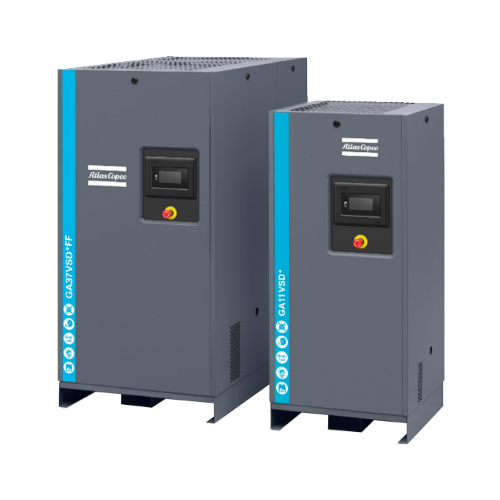
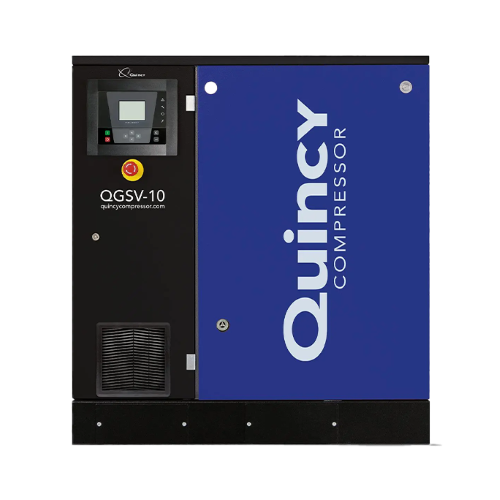
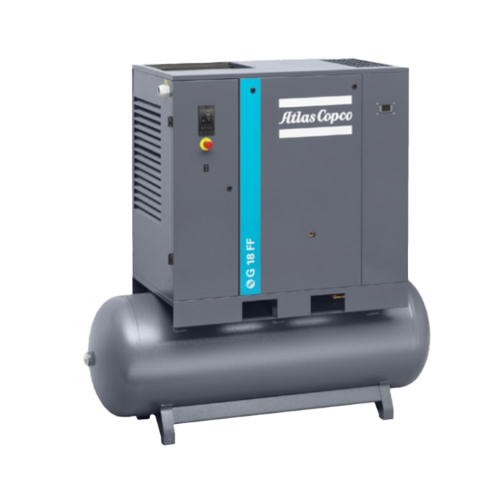
If you need personalized guidance to determine which compressed air system best suits your needs, our experts at AirCompressors.com are ready to help you find the right product for your business.
Understanding the difference between oil-free and oil-flooded air compressors is essential when selecting equipment that meets your air purity, performance, and maintenance needs.
Oil-flooded and oil-free compressors offer distinct benefits and are suited for different applications. This guide will walk you through the key differences between these compressors and the environments in which they perform best.
What Is an Oil-Flooded Compressor?
An oil-flooded compressor is an air compressor that utilizes oil for lubrication. It is suitable for a wide range of industrial applications. These units are known for their durability under heavy use and long-lasting performance.
How They Work
Oil-flooded compressors pull in the surrounding air and squeeze it into a limited space. The oil, typically kept in a sump, is injected into the compressor at key friction points. This lubrication helps minimize damage and heat buildup in the compression chamber during the process.
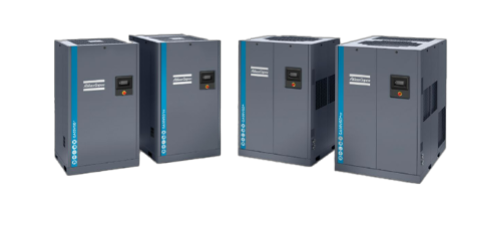
Advantages of Oil-Flooded Compressors
Oil-flooded compressors offer various advantages, including:
Heavy-Duty Performance
These units feature a robust build and high-capacity motors, allowing them to excel in high-pressure industrial applications, such as manufacturing and automotive operations.
Longevity
Oil-flooded compressors, with their extended lifespan when properly maintained, are not just reliable but also efficient. The oil's friction-reducing properties ensure less wear and tear, making it an innovative and cost-effective choice.
Cooler Operation
Oil is utilized to keep oil-flooded compressors cool and properly lubricated, allowing them to run efficiently for extended periods with a reduced risk of overheating.
Disadvantages of Oil-Flooded Compressors
While oil-flooded compressors offer unique advantages, potential purchasers should be aware of the following:
Maintenance
The units require regular oil changes, filter replacements, and routine maintenance to operate at top performance.
Risk
Oil-flooded air compressors carry a higher risk of contamination, as oil can enter the compressed air if the oil separator fails or the equipment is not properly maintained.
Limited Mobility
Oil-flooded air compressors are generally much heavier and larger than other air compressor options, which limits their portability. This could pose a challenge in applications where ease of mobility is a factor.
What Is an Oil-Free Compressor?
Oil-free air compressors use compressor designs such as scrolls, or materials such as Teflon, water, or air for lubrication. They are lighter and more compact, making them suitable for many applications, including the food and beverage industry, where air purity is essential.
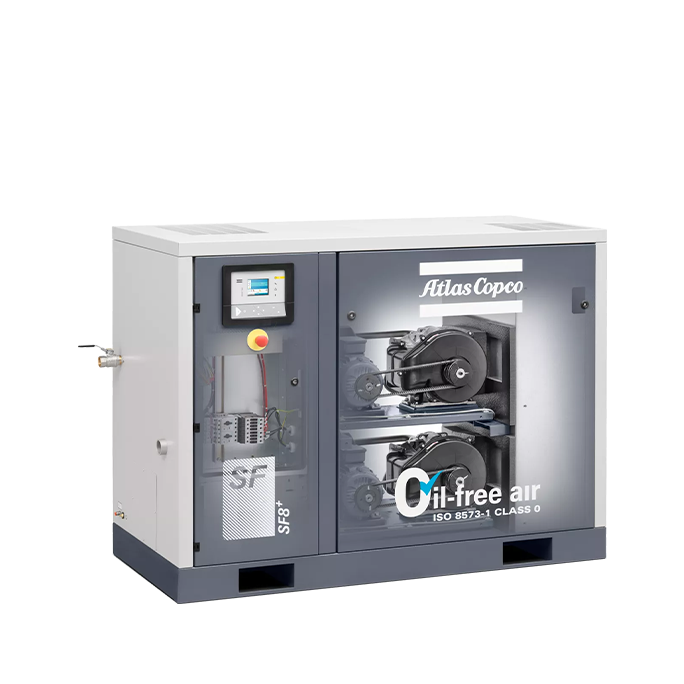
How They Work
Oil-free compressors operate by drawing in ambient air and then compressing it in a two-stage process. First, the air undergoes pre-compression, where it is partially compressed and cooled. In the second stage, final compression occurs, leading to further cooling and air release at the desired pressure.
Advantages of Oil-Free Compressors
Oil-free air compressors offer distinct advantages, such as:
Air Purity
Oil-free compressors use self-lubricating materials, such as Teflon-coated cylinders or water, which minimize friction while eliminating the risk of oil contamination in the compressed air, making them ideal for applications such as food processing and pharmaceuticals.
Low Maintenance
With no oil to change, oil-free compressors require less routine maintenance.
Portability
These units are typically more compact and lightweight, providing greater portability compared to larger, heavier oil-flooded compressors.
Adaptability
Because of their versatile, contamination-free design, oil-free compressors can be used effectively in many different industries and applications.
Disadvantage of Oil-Free Compressors
While oil-free compressors offer several advantages, other factors should also be considered.
Shorter Lifespan
Oil-free compressors typically have a shorter lifespan due to increased wear and tear from the lack of oil lubrication.
Noise Levels
These units may operate louder because they lack oil to dampen internal noise.
Capacity Limitations
Oil-free compressors generally have a lower capacity for repetitive or continuous tasks because the absence of oil lubrication leads to increased heat and wear during extended operation.
Key Considerations When Choosing Between Oil-Lubricated and Oil-Free Compressors
Let’s examine some key factors to consider when comparing oil vs oil free air compressors.

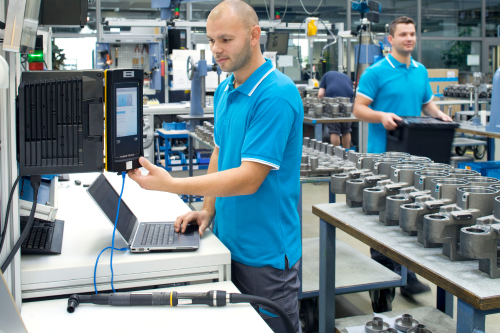
Air Quality Requirements
An oil-free compressor is the best choice for industries that require air purity, such as the food or pharmaceutical sectors. In contrast, an oil-flooded compressor is ideal for heavy manufacturing where high pressure and continuous use require the resilience and power that oil-flooded compressors provide.
Maintenance Requirements
Oil-flooded compressors require regular oil and filter changes for optimal performance, while oil-free compressors require lower maintenance. Consider your business’s capacity to manage maintenance when choosing a suitable compressor.
Performance and Longevity
Oil-flooded compressors stand out because of their durability and performance under continuous, heavy-duty strain. On the other hand, oil-free compressors are ideal for lower-duty tasks requiring the highest level of air purity.
Typical Applications for Oil-Lubricated and Oil-Free Compressors
Oil-free air compressors are best suited for industries such as food and beverage or pharmaceuticals, where air contamination must be avoided. The lighter, more compact design of oil-free compressors also makes them ideal for applications that require mobility, such as construction sites.
Conversely, oil-flooded air compressors are needed in heavy-duty manufacturing or automotive applications where high pressure and constant use are standard, but portability is not a priority.
AirCompressors.com Can Help You Choose the Right Equipment for Your Needs
The experts at AirCompressors.com have extensive experience in helping customers select the right equipment to meet their specific needs. Our compressed air professionals are available to discuss your industry and application, so you can confidently determine whether an oil-flooded or oil-free compressor is best for your business.
Contact us today for expert guidance and support.

